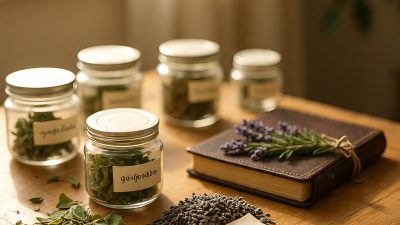If you’re tired of restless nights or relying on pills for sleep, you’re not alone. Fortunately, proven home remedies for better sleep naturally exist—and they’re simple, safe, and effective. By combining herbs, bedtime habits, and calming rituals, you can restore your body’s natural rhythm and fall asleep more easily, night after night.
In this guide, you’ll learn how to use proven home remedies for better sleep naturally with evidence-based methods that support deep rest without side effects.
Contents
- 1 Why Better Sleep Matters
- 2 1. Establish a Consistent Bedtime Routine
- 3 2. Use Herbal Teas and Natural Aids
- 4 3. Optimize Your Sleep Environment
- 5 4. Limit Blue Light Exposure in the Evening
- 6 5. Try Natural Supplements and Food-Based Remedies
- 7 6. Practice Relaxation Techniques Before Bed
- 8 7. Avoid Stimulating Substances in the Evening
- 9 8. Move Your Body Earlier in the Day
- 10 9. Use Aromatherapy and Essential Oils
- 11 10. Keep a Sleep Journal
- 12 When to Seek Professional Help
- 13 Conclusion
- 14 FAQ
Why Better Sleep Matters
Good sleep is not optional—it’s essential. It powers your immunity, boosts your mood, sharpens your focus, and supports overall vitality. Poor sleep, on the other hand, can lead to weakened immune function, weight gain, increased stress, and even chronic illness. Understanding how to improve your sleep using proven home remedies for better sleep naturally is a game‑changer for your health.
1. Establish a Consistent Bedtime Routine
How a Routine Helps Your Sleep Cycle
Going to bed and waking up at the same time every day helps regulate your internal clock. This predictable pattern encourages natural melatonin release and deeper rest over time.
Sample Evening Ritual
- Dim the lights 1 hour before bed
- Sip herbal tea (e.g., chamomile)
- Do 5 minutes of gentle stretching or yoga
Creating a calm environment supports your body’s readiness for sleep—and it’s one of the most effective proven home remedies for better sleep naturally.
2. Use Herbal Teas and Natural Aids
Chamomile, Valerian, and Lavender
These herbs have a longstanding history in promoting relaxation. Chamomile calms the body, valerian enhances restfulness, and lavender soothes the mind.
How to Use Them
Make a herbal infuser or warm tea 30 minutes before bed. You can add a few drops of lavender oil to a diffuser or pillow for added effect.
These are among the most dependable proven home remedies for better sleep naturally that have been used for centuries.
3. Optimize Your Sleep Environment
Light, Temperature & Noise Control
Keep your bedroom cool (between 65–68°F or 18–20 °C) and dark—blackout curtains help. Turn off or remove bright electronics and limit disruptive noise.
Bedding & Air Quality
High-quality pillows and breathable sheets help regulate temperature and reduce irritation. Use an air purifier or open windows for fresh airflow.
A comfortable environment reinforces sleep naturally—key to these proven home remedies.
4. Limit Blue Light Exposure in the Evening
Why Blue Light Disrupts Sleep
Electronic devices emit blue light that suppresses melatonin production. This delays your ability to fall asleep naturally.
Practical Steps
- Dim screens or use night mode after sunset
- Avoid TVs, phones, tablets 1 hour before bed
- Read a print book or listen to soft music instead
Reducing blue light supports your body’s natural signals to rest and is one of the most effective proven home remedies for better sleep naturally.
5. Try Natural Supplements and Food-Based Remedies
Magnesium, Tart Cherry Juice, and Melatonin-Rich Foods
Magnesium helps muscles relax and supports GABA, a calming neurotransmitter. Tart cherry juice contains natural melatonin. Foods like bananas, almonds, oats, and warm milk can also support melatonin production.
How to Incorporate
- A bedtime magnesium supplement (200–400 mg)
- ½ cup tart cherry juice in the evening
- Small banana or almond‑milk latte before bed
These edible remedies offer gentle, effective ways to support sleep naturally.
6. Practice Relaxation Techniques Before Bed
Deep Breathing, Progressive Muscle Relaxation & Visualization
Take 5–10 minutes each night to:
- Breathe slowly (inhale 4 sec, hold 4 sec, exhale 6 sec)
- Tense and relax each body part from toes to head
- Visualize a peaceful scene—like a calm beach or forest
These methods lower cortisol and ease you into dream-filled rest—some of the best proven home remedies for better sleep naturally.
7. Avoid Stimulating Substances in the Evening
Caffeine, Alcohol & Heavy Meals
Caffeine can linger for hours—avoid after mid-afternoon. Alcohol may put you to sleep but fragments rest. Large meals can cause indigestion.
Smart Alternatives
- Herbal tea or decaf
- Light evening snack if needed (yogurt or almonds)
- Finish eating 2–3 hours before bed
These simple shifts help preserve your natural sleep rhythm.
8. Move Your Body Earlier in the Day
How Physical Activity Improves Sleep
Exercise boosts endorphins, reduces anxiety, and helps synchronize your body clock. But timing matters—avoid vigorous workouts close to bedtime.
Good Practices
- Morning walks or midday stretching
- Gentle yoga or Tai Chi
- Light cardio or strength training in the afternoon
Regular movement complements proven home remedies for better sleep naturally by tiring your body in a healthy way.
9. Use Aromatherapy and Essential Oils
Calming Scents for Sleep
Lavender, chamomile, cedarwood, and sandalwood have soothing properties. Inhaling these scents can calm the nervous system and promote sleep.
Safe Application Tips
- Diffuse oils in your bedroom
- Dilute 2–3 drops in a carrier oil and apply to wrists or temples
Aromatherapy is a mild but effective tool among the many proven home remedies for better sleep naturally.
10. Keep a Sleep Journal
Tracking Sleep Patterns
Recording bedtimes, wake times, energy levels, and pre-bed habits helps identify what’s working—and what isn’t.
What to Record
- Meals and drinks (especially caffeine/alcohol)
- Stress levels
- Evening routines
- Quality of sleep (rested, disturbed, etc.)
Personal data allows you to fine-tune your routine over time—transforming guesswork into results.
When to Seek Professional Help
If you’ve tried several of these proven home remedies for better sleep naturally consistently and still struggle with insomnia, snoring, or daytime fatigue, it may be helpful to consult a sleep specialist or your healthcare provider. Conditions like sleep apnea or restless leg syndrome may require medical evaluation.
Conclusion
Sleep is the foundation on which everything else in your health is built. By incorporating these proven home remedies for better sleep naturally—like consistent routines, calming herbs, and thoughtful lifestyle choices—you empower your body to rest, heal, and thrive.
Start with one or two, build your routine, and give your body the care it deserves each night. You deserve good sleep—and you can reclaim it without medication.
Sweet dreams and deep rest await.
FAQ
What are the best natural remedies for better sleep?
Some proven home remedies include drinking chamomile tea, taking magnesium-rich foods, using lavender essential oil, practicing mindfulness or meditation, and maintaining a consistent bedtime routine.
Does drinking warm milk help you sleep better?
Yes, warm milk contains tryptophan and calcium, which can promote melatonin production and help you fall asleep faster.
Can herbs really improve sleep quality?
Absolutely. Herbs like valerian root, passionflower, and lemon balm are shown to have calming effects on the nervous system, aiding restful sleep.
How does lavender help with sleep?
Lavender has relaxing properties that can reduce anxiety and heart rate, creating a calming atmosphere that supports natural sleep.
Are natural sleep remedies safe for long-term use?
Most natural sleep remedies are safe for regular use, but it’s important to use them moderately and consult a healthcare professional if sleep issues persist.


